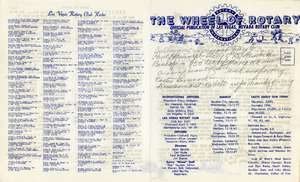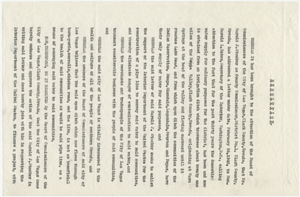Search the Special Collections and Archives Portal
Search Results
Melvin Green oral history interviews
Identifier
Abstract
Oral history interviews with Melvin Green conducted by Robin Fults on November 28 and December 1, 2014 for the African Americans in Las Vegas: a Collaborative Oral History Project. In this interview, Green talks about growing up in Bonita, Louisiana and his education through college. He then talks about working for an architectural firm in Connecticut before being recruited to join a firm in Las Vegas, Nevada in 1986. He relates numerous stories about his childhood, discusses problems with discrimination and segregation in the South, and an example of discrimination from a Las Vegas furniture store in the late 1980s. He expands on his views of religion, spirituality, and politics, the importance of travel, of hard work, and commitment. He also gives examples of architectural projects that he has created.
Archival Collection
José Luis Gutiérrez oral history interview
Identifier
Abstract
Oral history interview with José Luis Gutiérrez conducted by Maribel Estrada Calderón and Barbara Tabach on October 1, 2018 for the Latinx Voices of Southern Nevada Oral History Project. Also present during this interview is José’s close friend Sergio Salgado, who was interviewed separately for the Latinx Voices project in 2018.
José discusses his early life growing up in Guadalajara, Jalisco, Mexico, and his migration to Tijuana and then Santa Barbara, California as a teenager. He talks about his restaurant employment history both in California and in Las Vegas, including his time working at the Jolly Parrot, the Dunes Hotel and Casino, and his own eatery: Tortilleria Los Arcos.
Subjects discussed include: Tortilleria Los Arcos; Club Social Mexicano.
Archival Collection

Transcript of interview with Rabbi Sanford Akselrad by Barbara Tabach, October 29, 2014
Date
Archival Collection
Description
Sanford Akselrad is the rabbi at Congregation Ner Tamid. In this interview he describes his rabbinical training, coming to Las Vegas, and the growth of the congregation.
More inclined in his youth to pursue a career as a scientist than rabbi, Sanford Akselrad (1957- ) became the rabbi at Congregation Ner Tamid in 1988. Turning his tenure, Rabbi Akselrad has lead the congregation through its move from Emerson to Street to its permanent home on Green Valley Parkway and I-215 and shares a fun story about buying desks and chairs from the Clark County School District. He talks about many of the milestones including: Project Ezra which he started during the 2008 recession to help Jewish community members find jobs; the NextGen program which was initiated to bring young adults in their twenties and thirties back to the temple. For over twenty years Rabbi Akselrad was a member of the board of the Nevada Governor?s Council on Holocaust education, a topic that was the focus of his rabbinical thesis. He was the founding president of the Clark County Board of Rabbis and has served on the boards of the Jewish Federation of Las Vegas, Jewish Family Services, and the Humana Hospital Pastoral Advisory Board. He was also the chair of the Federation?s Community Relations Council (CRC). Rabbi Akselrad is a board member of the Anti-Defamation League Nevada region office and the Interfaith Council of Southern Nevada. Sanford Akselrad was born on October 6, 1957 in Oakland, California and raised in Palo Alto. He attended the University of California, Los Angeles and then went to graduate school at the Hebrew Union College Jewish Institute of Religion. He spent the first year of his graduate program in Israel, the next two in Los Angeles, and the final two years in Cincinnati, Ohio. Rabbi Akselrad met his wife Joni in Reno, Nevada and married her during his third year of rabbinical school. The couple has two children, CJ and Sam. After his ordination in 1984, Rabbi Akselrad was associate rabbi of Temple Israel in Columbus, Ohio, one of the largest Reform congregations in the Midwest. His choice of career was inspired by his father, Sidney Akselrad, who was a prominent rabbi involved in social justice issues and the Civil Rights Movement. Sanford Akselrad has followed his father?s example of community involvement, both in Las Vegas and on a national level: he served on the board of the National Conference of Community and Justice (NCJJ), he was chair of the NCJJ's Inter-faith Council, and he is active in the Union of Reform Judaism (URJ).
Text

The Wheel of Rotary Las Vegas Rotary Club newsletter, April 6, 1950 with handwriting
Date
Archival Collection
Description
Text
Alice Key oral history interview
Identifier
Abstract
Oral history interview with Alice Key conducted by Claytee D. White on February 17 and March 24, 1997 for the Women's Research Institute of Nevada (WRIN) Las Vegas Women Oral History Project. In this interview Alice Key discusses being a chorus line dancer at the Cotton Club in Culver City, California and then moving to Las Vegas, Nevada after her dancing career ended. She then talks about working as a reporter, her involvement with the civil rights movement in Las Vegas, and creating the first all-black television show in the country: Talk of the Town.
Archival Collection

Resolution by Board of Commissioners (Las Vegas) to support Harold J. Stocker's letter, circa February 26, 1940
Date
Archival Collection
Description
Resolution to support Harold J. Stocker's letter requesting funds from the Arid Lands Fund for improvement of the domestic water supply for the Moapa Valley. Link to actual letter located in Relations field.
Text
John Cahlan oral history interview
Identifier
Abstract
Oral history interview with John Cahlan conducted by Gordon R. Brusso on March 30, 1977 for the Ralph Roske Oral History Project on Early Las Vegas. Cahlan talks about early Las Vegas, Nevada entertainment.
Archival Collection
Overview of the Property Development, 1997-2016
Level of Description
Scope and Contents
Phases of the property development of the project, US Secretary of the Interior's Standards of Rehabilitation, awards and accolades, special appreciation efforts to individuals for property development.
Archival Collection
Collection Name: Junior League of Las Vegas' Records on the Morelli House Preservation Project
Box/Folder: Box 01
Archival Component
Jack Cherry oral history interview
Identifier
Abstract
Oral history interview with Dr. Jack Cherry conducted by Lowell Christie on June 17, 1972 for the Ralph Roske Oral History Project on Early Las Vegas. Cherry discusses environmental change in Las Vegas, Nevada. Cherry also recalls experiencing an atomic bomb test.
Archival Collection
Roy Brown oral history interview
Identifier
Abstract
Oral history interview with Roy Brown conducted by Rick Godwin on May 21, 1976 for the Ralph Roske Oral History Project on Early Las Vegas. During this interview Brown discusses his career as a hairstylist, celebrities he has styled, and the growth of the haircutting industry in Las Vegas, Nevada.
Archival Collection
